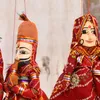Art as a safe haven during the pandemic – artistic tips on resilience from the Chitra Santhe exhibitors
In this photo essay, we showcase the artworks and journeys of three artists. It is key to push yourself to learn something new every day during times of crisis, they explain.
Launched in 2014, PhotoSparks is a weekly feature from YourStory, with photographs that celebrate the spirit of creativity and innovation. In the earlier 535 posts, we featured an art festival, cartoon gallery. world music festival, telecom expo, millets fair, climate change expo, wildlife conference, startup festival, Diwali rangoli, and jazz festival.
In this photo essay series, we profile artworks and creative insights from the participating artists at Chitra Santhe 2021 (see our extended coverage here)
Hosted by Karnataka Chitrakala Parishath in Bengaluru, the 18th edition of the annual art festival was held virtually from January to March this year due to the pandemic. The online exhibition wrapped up with a showcase of over 1,000 artists from India and overseas.
See also YourStory’s coverage of six earlier editions of Chitra Santhe: 2020, 2019, 2018, 2017, 2016 and 2015, as well as compilations of Top Quotes of 2020 on Art in the Era of the Pandemic, Indian Art, Art Appreciation and Practice, and Beauty and Business of Art.

Artist: Suruchi Jamkar
Suruchi Jamkar
“Art is the journey of my life, it gives my existence a meaning and it is my primary Ikigai,” explains Suruchi Jamkar, in a chat with YourStory (see my review of the book Ikigai here).
“Success is just a perception. I believe that all human beings are the same on the base level, each living and shaping themselves according to the story of their life,” she adds. She paints her heartfelt experiences, and sees success in effective expression and connecting with viewers.
Indian society has progressed over the past couple of decades, and has started finding the resources and education towards more aesthetics of life. “Moving away from basic struggles has made room for all art forms in even the common citizen’s life,” Suruchi observes.
“Painting is my safe haven and that is what has kept me sane during the pandemic. During the period of lockdowns, I found myself having a deeper connection with my 14-year old daughter. We spoke about many things including life and how to go about it – I put it into my works,” she recalls.
One of her paintings features a girl plucking stars from a starry night. Suruchi’s artworks are priced from Rs 10,000 to Rs 5 lakh. “I also offer limited prints for Rs 2,999/- as I want my art to be available for all. Art motivates us and gives a deeper meaning to our lives," Suruchi says.
She appreciates the wider access of an online exhibition and its global reach. “What I miss is the physical interaction with the viewers. The connect and the satisfaction of good conversation is unparalleled,” she remarks.
“Learn to think original. Travel, explore, read. Paint what touches you. Don't blindly follow trends and schools, be yourself and find your own language,” Suruchi advises aspiring artists.

Artist: Isha Hingrajiya
Isha Hingrajiya
“I just don't dream about paintings. I paint because I love it. To me art is indefinite. There is no full stop when it comes to art; it is an eternal learning and exploration of your creativity,” explains Isha Hingrajiya.
She started off as a computer engineer and lecturer. “But the passion towards art brings me to be a professional artist,” she adds. Her motto is Art for All.
“Art should be easily accessible and affordable to all. When I see my art being purchased and installed by people from all walks of life – not only the rich – I feel very happy and consider myself successful,” Isha enthuses.
She calls for a wider appreciation of art in society. “The Art for All motto can be a gamechanger. Art should be affordable to all, but I am not saying that it is overvalued or overpriced,” she explains. Her works are priced from Rs 199 to Rs 19,999.
Isha has been creating bright, multicoloured paintings to overcome the darkness created by the pandemic. “You can see them in themed works such as Womb, Trinity, Fluid Fusion, and Polychromatic Ganesha,” she explains.
“The pandemic has definitely been a difficult time for all. The key thing I kept in my mind was to learn something new every day and keep motivating myself,” she says.
“It was difficult to approach people for selling art as you can't meet them in person. It is difficult to convince them to buy art without showing them your work physically,” Isha laments.
But she appreciated the extended duration of the online festival. “The organisers of Chitra Santhe deserve credit for excellent work done for the online event. However, I still miss the feel and excitement I used to get at physical exhibitions,” she adds.
Isha also observes that many people hesitate to contact artists via digital channels. “It would be much more interesting and easy in case of a physical exhibition,” she observes. She suggests that the exhibition be a combination of online and physical event next year.
“Keep learning, Try to bring more creativity into your life. Nothing can beat your hard work and passion,” Isha advises aspiring artists.

Artist: Kariyappa Hanchinamani
Kariyappa Hanchinamani
“For me, art is an expression of feelings through lines and paints. Its main aim is to give happiness across changes in life, forms, experiences, and value,” explains Kariyappa Hanchinamani. Most of his paintings reflect the lifestyle of rural areas, especially folk customs.
He views success in how artwork reaches and influences people, not just in market value or awards. “We should try to bring out the hidden meaning of art so that more people can understand its importance and take interest in it,” Kariyappa advises.
“Because of the pandemic, my complete lifestyle was changed,” he explains. He is busy with police duty, but also devotes time to painting.
“Unfortunately, physical art exhibitions have stopped. So we have to pick up skills in online video communication, apps, and internet research,” Kariyappa says.
“Online exhibitions allow us to exhibit safely despite the pandemic, and get worldwide publicity. But we miss chatting and forming bonds with viewers, and sharing ideas with other artists,” he laments.
Kariyappa also offers words of advice for aspiring artists. “Artists today have so many more opportunities – they must use them properly and develop themselves. Develop your inner strength and use your own eye for appreciation,” he says.
“If artists develop and express their own consciousness while painting, only then will the artworks stay in the hearts of people forever,” Kariyappa signs off.
Now, what have you done today to pause in your busy schedule and find new avenues to harness your inner creativity?

Artist: Meghna Sharma

Artists - Rani Rekha (L), Jeyaprakash M (R)

Artist: GOPAL KAMMAR

Artist: Gopinath Sanda

Artist: Isha Hingrajiya

Artist: Jagdish Mohanty

Artist: Jeya Prakash

Artist: Kariyappa Hanchinamani

Artist: Laxmi Mysore

Artist: Mahesh Soundatte

Artist: Neelu Patel

Artist: Nivedita Gouda

Artist: Priya Ghosh

Artist: Subhajit Paul

Artist: Anna Krzemińska

Artist: Swathi P N

Artist: Suruchi Jamkar
See also the YourStory pocketbook ‘Proverbs and Quotes for Entrepreneurs: A World of Inspiration for Startups,’ accessible as apps for Apple and Android devices.
Edited by Kanishk Singh









